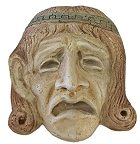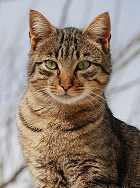A couple of weeks ago I wrote about nootropics, or "smart drugs." Naming consultant Nancy Friedman pointed me to another article that mentions the movie Limitless, about a writer who uses a "mysterious pill" to unlock his super abilities. The article notes that it's "a classic tragedy of hubris to hamartia."
 The word hamartia was new to me.[1] I was generally familiar with the concept, I think. Stated simply, hamartia is the idea that a tragedy is the result of a fatal flaw or fatal error committed by the protagonist. This was formulated in Aristotle's Poetics, where he describes a tragedy that consists of a noble person who enjoys good fortune but who is brought down not by "villainy" but by a mistake. (In Greek, hamartanein is "to err.")
The word hamartia was new to me.[1] I was generally familiar with the concept, I think. Stated simply, hamartia is the idea that a tragedy is the result of a fatal flaw or fatal error committed by the protagonist. This was formulated in Aristotle's Poetics, where he describes a tragedy that consists of a noble person who enjoys good fortune but who is brought down not by "villainy" but by a mistake. (In Greek, hamartanein is "to err.")
A lot of thinking has gone into how hamartia manifests. Sometimes the hero makes the error unwittingly, like Oedipus unknowingly killing his father. Sometimes circumstances force the character into the mistake that results in tragedy. After the Greeks, hamartia came to include the idea of a moral failing or inherent flaw, like Othello's jealousy. There's a sense that the tragedy plays out as a kind of fate beyond a person's control—the will of the gods. Or as described by Shakespeare's "star-cross'd lovers"—a phrase that appears in the prologue to Romeo and Juliet, suggesting the inevitability of the outcome. Hamartia is often paired with hubris (as in the article)—that is, with excessive pride—that can in itself be the fatal flaw. ("Pride goeth before destruction, and an haughty spirit before a fall," Proverbs 16:18)
I suppose for the next little while, I'll be obsessing about hamartia as I watch drama on TV. How did hamartia factor into Game of Thrones? Is it a force in HBO's Succession? That one we'll have to wait to see. And, ahem, not to mention keeping tabs on current events.
(Now that I think about it, I was looking into the origins of tragedy not long ago. I hope this is not some sort of foreshadowing.)
Origins. I'm reading a book about cats, which starts with a natural history of Felis catus. As I learned, the wildcat from which our housecats descend had (has) what are called Mackerel tabby markings. And where does the word tabby come from, anyway? John Bradshaw, the author, gives us the story.
 This is another one of those words that's wandered quite a bit. (See also marzipan in FW #145.) We got the word tabis from French, where it was used for a type of silk that was originally striped. Starting in the 1600s, the word tabby was used in English to refer to silk taffeta, a sense that survived till at least the late 1800s.
This is another one of those words that's wandered quite a bit. (See also marzipan in FW #145.) We got the word tabis from French, where it was used for a type of silk that was originally striped. Starting in the 1600s, the word tabby was used in English to refer to silk taffeta, a sense that survived till at least the late 1800s.
The word was applied to cats starting in the 1700s to describe the striped markings of a tabby cat, and from there a cat that had such markings. ("The civet..varies in its colour, being sometimes streaked, as in our kind of cats called Tabbies.")
Winding further back, French got its word tabis from Arabic attabi, which came from the area (Attabiyah) in the city of Baghdad where the silk was first made. The neighborhood in Baghdad was named for a certain prince Attab.
To reiterate: A prince gives his name to a neighborhood, which becomes a name for the silk made there, which becomes a generic name for (striped) silk, which becomes a word for the striped coat of a cat. Words really do make some amazing journeys sometimes.
Like this? Read all the Friday words.
 |
|

 |
|
